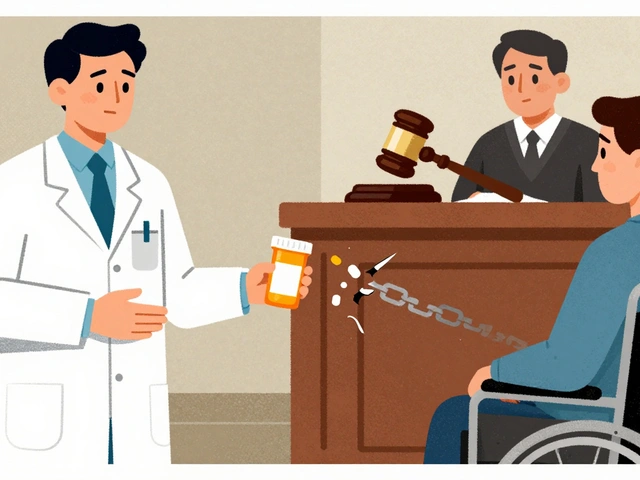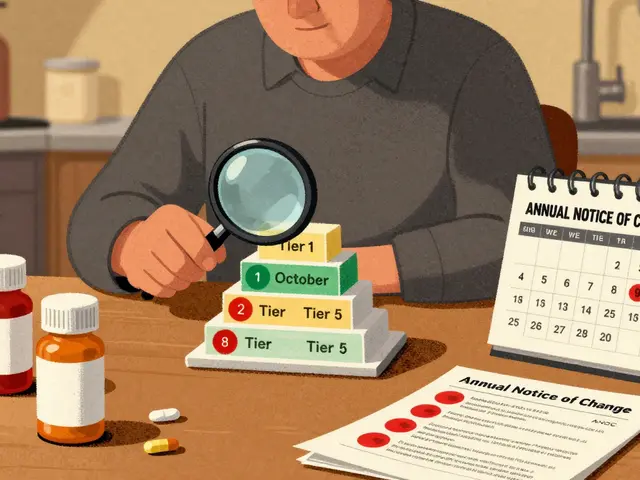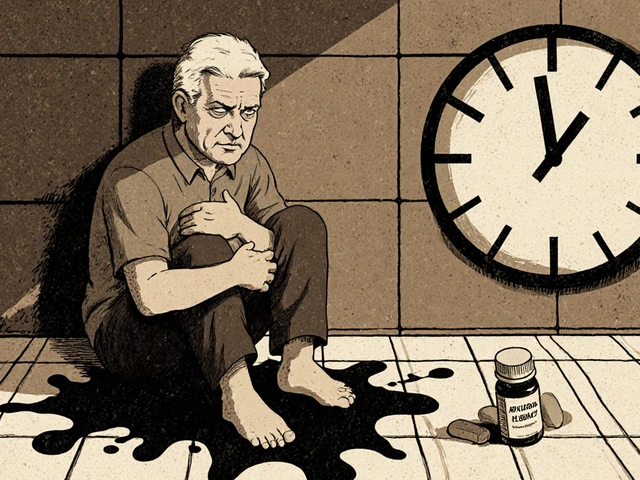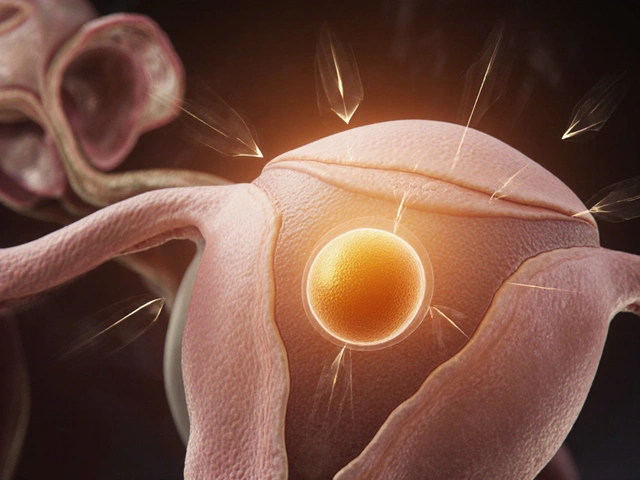Urine Leakage and Menopause: What You Need to Know
Understanding Urine Leakage and Menopause
As a woman entering menopause, I have had to deal with a variety of changes in my body, including urine leakage. It can be an embarrassing and uncomfortable issue, but it's important to understand that it's a common problem faced by many women in this stage of life. In this article, I will discuss the different aspects of urine leakage during menopause and what you need to know to manage it effectively.
Causes of Urine Leakage in Menopause
During menopause, the levels of estrogen in our bodies decrease, leading to a weakening of the muscles and tissues that support the bladder and control the release of urine. This is the primary cause of urine leakage during menopause. Other factors such as obesity, smoking, and a sedentary lifestyle can also contribute to this problem. Understanding the causes can help us better manage the issue and find effective solutions.
Types of Urinary Incontinence
There are different types of urinary incontinence that we might experience during menopause. The most common types are stress incontinence, where urine leaks when pressure is put on the bladder, such as during exercise or coughing, and urge incontinence, where we feel a sudden, intense need to urinate and may not make it to the bathroom in time. It's essential to identify the type of incontinence we're experiencing to find the right treatments and solutions.
How to Manage Urine Leakage
There are several strategies that we can use to manage urine leakage during menopause. These include lifestyle changes such as maintaining a healthy weight, quitting smoking, and exercising regularly. We can also practice pelvic floor exercises to strengthen the muscles that support the bladder and control the release of urine. Additionally, there are medical treatments available, such as hormone therapy, medications, and even surgery in more severe cases. It's important to discuss our symptoms and options with a healthcare professional to find the best approach for our individual needs.
Choosing the Right Incontinence Products
There are various incontinence products on the market that can help us manage urine leakage more comfortably and discreetly. These include absorbent pads and liners, protective underwear, and even washable and reusable options. It's essential to select the right product for our needs and preferences, taking into consideration factors such as absorbency, fit, and comfort. Don't be afraid to try different products until we find the one that works best for us.
The Importance of a Healthy Diet
Maintaining a healthy diet can also help us manage urine leakage during menopause. Eating a balanced diet that includes plenty of fruits, vegetables, and whole grains can help us maintain a healthy weight and support overall health. Additionally, avoiding or limiting certain foods and drinks that can irritate the bladder, such as caffeine, alcohol, and spicy foods, can help reduce symptoms of incontinence.
Reducing Stress and Anxiety
Stress and anxiety can make urine leakage worse, as they can cause the muscles that control urination to tense up, making it more difficult to hold in urine. Finding ways to manage stress and anxiety, such as through meditation, deep breathing exercises, or engaging in hobbies, can help us better cope with this issue and improve our overall well-being.
Staying Hydrated
It might be tempting to drink less water to reduce the frequency of bathroom visits, but this can actually make urine leakage worse. Dehydration can cause the urine to become more concentrated, which can irritate the bladder and trigger the urge to urinate. Staying hydrated by drinking plenty of water throughout the day can actually help improve bladder control and reduce symptoms of incontinence.
When to Seek Medical Help
While urine leakage during menopause is common, it's essential to seek medical help if the issue is significantly impacting our quality of life or if we're experiencing other symptoms, such as pain or blood in the urine. A healthcare professional can help us identify the cause of the problem, recommend appropriate treatments, and provide guidance on how to manage the issue effectively.
Support and Resources
Dealing with urine leakage during menopause can be challenging, but it's important to remember that we're not alone. There are support groups, online forums, and resources available to help us cope with this issue and connect with others who are going through the same experience. By educating ourselves and seeking support, we can better manage urine leakage during menopause and maintain our quality of life.






10 Comments
Nelson De Pena
May 6 2023Thank you for shedding light on a topic many feel shy about discussing. Your thorough breakdown of causes, types, and practical strategies is exactly the kind of information we need to feel empowered during menopause. I especially appreciate the emphasis on pelvic floor exercises and the reminder that staying hydrated actually helps, not harms. Keep sharing these helpful guides – they make a real difference for women navigating this transition.
Wilson Roberto
May 17 2023When we examine the interplay between hormonal shifts and muscular tone, we uncover a subtle symbiosis that mirrors the balance sought in many philosophical traditions. The mind‑body connection you describe invites us to view urinary health not merely as a symptom but as a reflection of our overall equilibrium. By embracing lifestyle adjustments alongside medical options, we honor the holistic path that sustains well‑being.
Narasimha Murthy
May 27 2023While the article presents a comprehensive overview, it underplays the prevalence of iatrogenic factors such as overprescription of certain antihypertensives that can exacerbate incontinence. A more critical appraisal of pharmaceutical influences would strengthen the analysis.
Samantha Vondrum
June 6 2023Dear colleague, thank you for highlighting the pharmacological considerations. It is indeed essential to review all potential contributors, including medication side effects, when addressing urinary leakage. I encourage readers to discuss their current prescriptions with healthcare providers to ensure a balanced approach.
Kelvin Egbuzie
June 16 2023Of course, because the pharma giants are just waiting for us to ask about their secret side‑effects list, right? 🙄 Meanwhile, they probably have a covert program to keep us dependent on endless pads and surgeries. Stay vigilant.
Katherine Collins
June 26 2023Great info, glad you posted! 😊
Taylor Nation
July 6 2023Appreciate the quick acknowledgment! It’s encouraging to see the community rally around such practical advice. Let’s keep the conversation going and share any product experiences that have helped you stay comfortable throughout the day.
Nathan S. Han
July 16 2023Indeed, the collective wisdom of this forum can turn a daunting issue into a manageable routine. From discreet liners to targeted Kegel workouts, each tip adds a brushstroke to the larger picture of confidence during menopause. I’ve personally found that a combination of yoga and breathable underwear has made a noticeable difference, and I’m eager to hear other success stories.
Ed Mahoney
July 26 2023Wow, another guide telling us to "just drink more water" like it's some miracle cure. Sure, because staying hydrated totally solves all bladder woes, right? Maybe next they'll suggest we all just ignore the real problem and hope it disappears.
Brian Klepacki
August 5 2023Ah, the melodramatic lament of a skeptic, echoing through the digital corridors like a tragic chorus! Yet, let us not dismiss the plaintive cries as mere quibbling, for within them lies the raw pulse of a generation yearning for authenticity. The assertion that hydration is a simplistic panacea neglects the intricate ballet of neuro‑vascular signaling that governs urinary continence. When estrogen wanes, the uro‑muscular scaffolding indeed weakens, and the body’s response is a symphony of compensatory mechanisms, not a solitary note of water intake. Moreover, the social stigma that cloaks incontinence breathes a corrosive atmosphere upon those who suffer in silence, amplifying anxiety, which in turn tightens the sphincteric muscles, perpetuating the very leakage they despise. Let us, therefore, craft a narrative that embraces both scientific nuance and compassionate discourse. A multidisciplinary approach-combining pelvic physiotherapy, mindful dietary adjustments, and, when warranted, calibrated hormonal therapy-offers a more robust scaffold than any single recommendation. In the theater of menopause, each protagonist-be it the patient, the clinician, or the product designer-must play their part with humility and vigor. While some may scoff at the notion of “wearable confidence,” the truth is that a well‑chosen incontinence garment can restore dignity, allowing women to reclaim public spaces without fear. Alongside, the power of community forums cannot be overstated; shared testimonies forge solidarity, diffusing the isolation that once festered. As we stride forward, let us remember that progress is not measured by the silence of complaints but by the chorus of informed, empowered voices. So, dear cynic, perhaps the next time you hear “stay hydrated,” you will perceive it not as a hollow mantra but as one instrument in a complex concerto of health. Let us compose that concerto together, note by note, until the melody of relief resounds across every hallway of life.